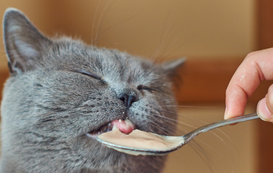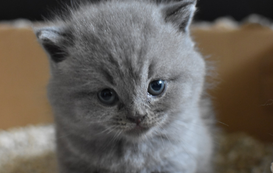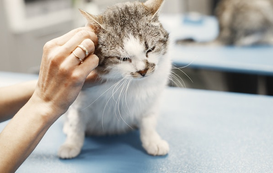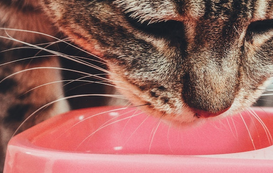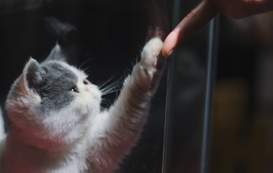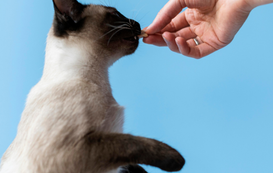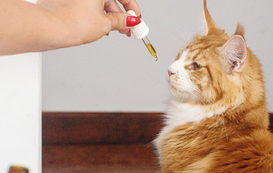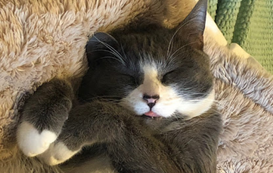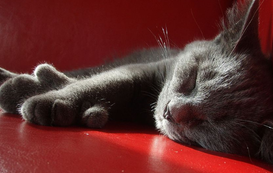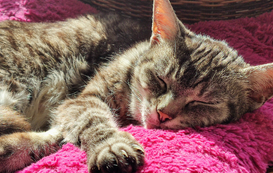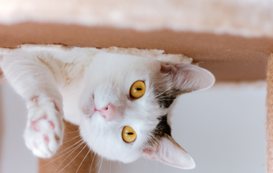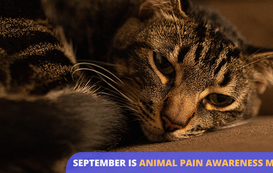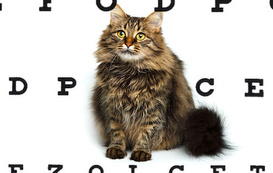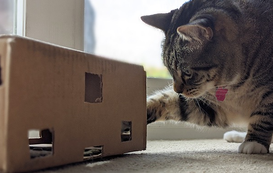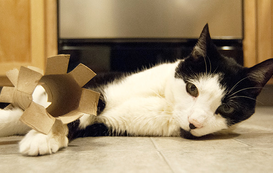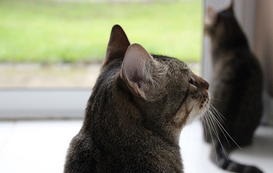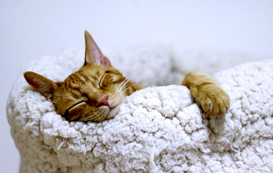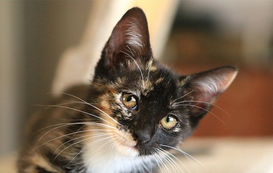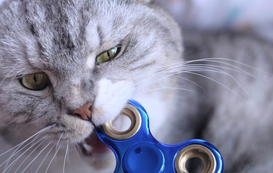- Home
- Cat Sitter Blog
- Cat Health
- 5 Ways to Help Your Cat Live a Long and Healthy Life


Popular posts
5 Ways to Help Your Cat Live a Long and Healthy Life
Did you know? Being a cat parent can bring health benefits, such as helping to decrease your odds of dying from heart disease and reducing the risk of depression.
And the fringe benefits of having fur babies last our entire lives: Studies indicate that senior pet owners make 30% fewer doctor visits than those who don't have a furry companion.
So, the evidence is clear: your kitty can help you be healthy and stay that way. Pay them back in kind with these five ways to help your cat live a long, healthy life:
1. Give Your Kitty a Regular DIY Exam
Once a week, take your cat into a well-lit, quiet room (bright morning sunshine in front of a large window or glass door works great). Then examine your kitty from the top of their adorable nose to the tip of their precious tail.
Be on the lookout for any health red flags, such as redness or discharge from the eyes or ears or an unpleasant odor from the ears that could indicate infection. Run your hands over their body and notice if they react in a way that indicates certain spots are tender. Feel around to find any new lumps or bumps and see if any existing ones have gotten larger. If you’re able to, try to check their lymph nodes are not enlarged.
Regularly doing these checks will help you learn the difference between what is normal for your cat and anything that may cause concern. If you spot or feel something unusual, take them to a vet right away.
2. Brush Those Chompers
If you don't already brush your cat's teeth, it's time to start. It's not just about preventing bad breath - daily brushing can help your cat live longer, feel better, and eat well throughout their life.
Periodontal disease can be debilitating and seriously harm a cat's mouth, resulting in chronic pain and tooth loss. It can also contribute to significant health issues, including heart, kidney, and liver problems. These disorders can take hold at a surprisingly early age, adversely affecting a cat's lifespan. Also, brushing allows the opportunity to examine your cat's mouth. If you notice their gums are red or swollen, take them to see the veterinarian as soon as possible.
Traditionally, kibble has been tasked with cleaning kitty's teeth, but that barely scratches the surface - literally! Some specially formulated treats may also help clean plaque from teeth or diminish tartar, but they are no replacement for a good brushing. So, tell your kitty to open wide and polish those purr-ly whites.
3. Get Kitty Off the Couch
According to one study, diabetes in felines increased by nearly 20 percent over a decade. The leading cause of diabetes in cats is identical to humans: a sedentary lifestyle leading to weight gain. The good news is there are countless cat toys to pick from, and many are super affordable. As a rule of thumb, cats should get at least 15 minutes of playtime every day.
Mental stimulation is essential for cats, too, so make sure they have lots of different activities to keep them entertained. Since cats are carnivores, hunting games such as chasing a wand or playing hide and seek with favorite toys will satisfy their instincts and help them feel happier while providing much-needed activity.
While one-on-one quality time is ideal, it's a good idea to buy at least one interactive toy that does not require human assistance, such as a ball on a track, so your kitty can be active when you're busy. Also, try puzzle treat dispensers that allow your cat to receive a tasty reward while keeping themselves occupied when you're not there.
4. Invest in Your Bestie
If your budget allows it, consider purchasing a pet health insurance policy to help cover the cost of veterinary care for unexpected injuries, illnesses, and surgery. No cat parent wants to face making do with a less-effective treatment versus getting the best care possible due to the bottom line. Choosing cost-effective "Band-Aid" solutions over the preferred treatment plan can adversely impact your kitty's well-being.
For instance, if your cat needs surgery as the ideal treatment for an issue, but you have to rely on medication alone to alleviate the symptoms (rather than treating the root cause), this could affect their quality of life and their quality of life also their lifespan. A pet insurance policy will help give you peace of mind that you’ll be able to choose the best treatment option without the cost being a barrier.
If you wish to sign up for coverage, be sure to compare shop policies so you will be certain of what you coverage does and doesn’t cover should the time come. In the meantime, you will have reassurance that if something goes wrong, you won't have to sacrifice quality care.
If you cannot - or would rather not - purchase a pet insurance policy, be sure to sock away what you can spare into a savings account earmarked for vet expenses. It may mean a few sacrifices now, but you'll be delighted that money is there if and when you need it.
5. Be Right on Time for Routine Checkups
It's essential to continue regular checkups throughout your cat's lifespan.
For the first 16 weeks of life, kittens should be examined by their veterinarian once every three to four weeks. Adult cats require yearly physical examinations. Senior cats should be seen by their vet about every six months.
A regular exam enables your veterinarian to assess your cat and help maintain optimal health. During your cat's routine examination, your vet will have the chance to discuss your cat's specific circumstances and whether any medications or lifestyle changes are appropriate. Vets often spot issues at routine checkups before they have the chance to worsen. That allows for earlier diagnosis and treatment, which is always preferable and typically less expensive.
If your cat already has any chronic conditions, such as diabetes or renal disease, ask your vet how often they need to be seen as they may need more frequent routine visits.
Then, no matter how frequent they are, always keep those appointments!
The Takeaway
There are many ways to help your kitty stay healthy for years to come, and today we’ve discussed just a few. With some planning and extra attention, you can ensure your kitty is by your side for as long as possible.
Our sitters know how to take great care of cats in every life stage, from kittenhood to their golden years, and many have skills in administering medications or addressing other special needs. Start your search here!
Photo by Preillumination Seth on Unsplash


